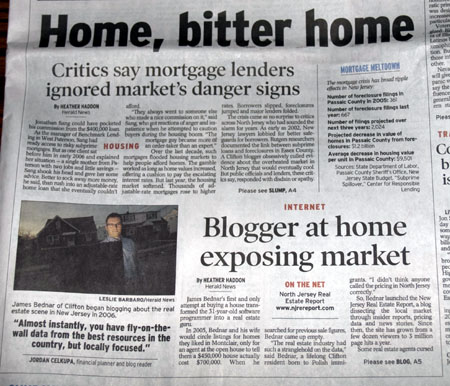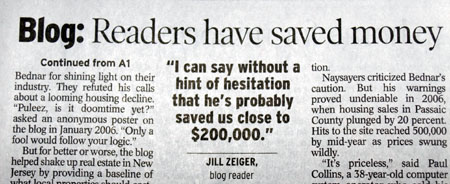From the WSJ:
Home Sellers’ Pain Is Renters’ Gain
By NICK TIMIRAOS
January 15, 2008
There’s one bright side to the housing crisis: some lower rents.
The regions hardest hit by the housing downturn have seen ailing builders, rising foreclosure rates and a glut of unsold homes, amid other signs of distress. But there are also stories like Laura Evans’s.
The 38-year-old elementary-school teacher moved to Stuart, Fla., from Orlando with her husband and baby last fall. Looking for a rental apartment, they were pleasantly surprised: There were plenty of choices at lower-than-expected prices, thanks to the multitude of owners trying to rent units they couldn’t sell.
“When we got down here, we shopped and shopped around,” says Ms. Evans, who rented a new 2,200-square-foot, three-bedroom townhouse with a pool and a playground for $1,150 per month. The owners allowed the couple to move in with their dog, despite a prohibition against pets.
To be sure, rents have continued to rise steadily in many markets. And the housing downturn means that more people are looking for rentals as well, increasing demand. Many would-be buyers have become renters because they can’t get a mortgage in today’s tight credit environment, or because they’re sitting tight in hopes that prices drop further.
…
Behind the trend are tens of thousands of unsold condominium units that are being dumped on markets such as South Florida, Las Vegas and Phoenix. While thousands of single-family homes also are coming on the market, renters prefer condos to houses, which typically have more expensive upkeep. “Tenants have to pick up more of the bills,” says Artur Ciesielski, a Phoenix real-estate agent.
…
More than 4,200 units have been pulled out of the for-sale condo market and put into the rental pool in Florida’s Palm Beach County alone, according to Mary Grace Breeding, president of McCabe Research & Consulting in Deerfield Beach. Those units include the 216-unit Aventine at Boynton Beach and the 450-unit Mizner Court at Broken Sound in Boca Raton, where rents range from $975 to $2,000.Nor are so-called condo reversions limited to the Sunbelt. In Brooklyn, N.Y., two luxury condo developments converted to rental apartments last spring, including 99 Gold Street, which had begun accepting sales contracts less than a year earlier. Rentals at the 88-unit building range from $2,000 a month for 700-square-foot studios to $5,500 for two-bedroom penthouses.
…
Savvy renters in struggling markets are playing landlords off each other. Ms. Evans, of Stuart, Fla., says the same day she and her husband leased their apartment for $1,150 a month, the owner of a bigger home they had looked at called to lower his asking price from $1,500 to $1,200. “If he had called earlier, we would have taken it,” she says.
…
Housing experts predict that many would-be home buyers may be forced to rent for years because the relationship between rents and home prices are out of whack. Rents remained at around 5% of home prices throughout much of the postwar period, but beginning in 1996, home-price growth rapidly outpaced rent growth. By the end of 2006, home prices had more than doubled while average rent was up just 48%, driving down the annual rent/price ratio to 3.48%.A study by one former and two current Federal Reserve economists suggests that home prices will have to fall by 15% over the next five years while rents increase by 4% a year to return that rent/price ratio to normal.

 (Leslie Barbaro/Herald News)
(Leslie Barbaro/Herald News)
